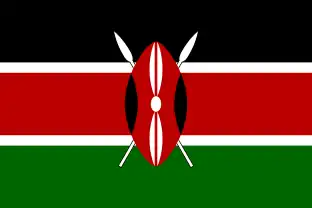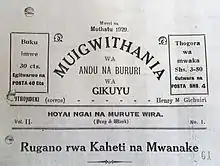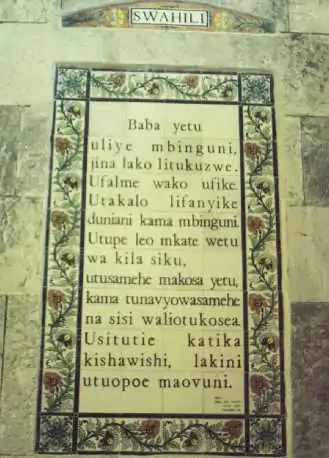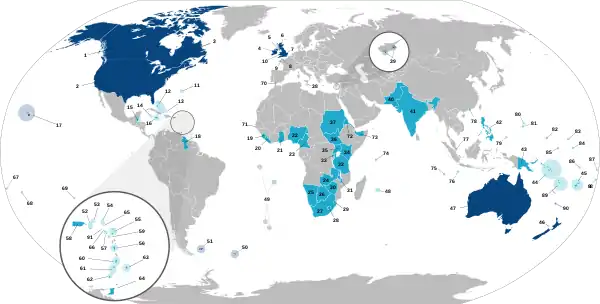Languages of Kenya
Kenya is a multilingual country. The two official languages of Kenya, Swahili and English are widely spoken as lingua francas; however, including second-language speakers, Swahili is more widely spoken than English.[2] Swahili is a Bantu language native to East Africa and English is inherited from British colonial rule.
| Languages of Kenya | |
|---|---|
 English shop sign in Nairobi | |
| Official | English and Swahili[1] |
| Main | Swahili (lingua franca) |
| Indigenous | Bajuni, Digo, Embu, Gusii, Idaxo-Isuxa-Tiriki, Ilwana, Kamba, Khayo, Kikuyu, Kuria, Logoli, Luhya, Marachi, Mijikenda, Meru, Nyole, Pokomo, Samia, Suba, Taita, West Nyala, Aweer, Burji, Daasanach, Dahalo, El Molo, Orma, Oromo, Teso, Rendille, Somali, Southern Oromo, Waata, Yaaku, Kipsigis, Luo, Maasai, Naandi, Ogiek, Omotik, Pökoot, Samburu, Tugen, Turkana |
| Regional | Kikuyu, Luhya, Luo, Meru, Kalenjin, Kamba, Somali |
| Signed | Kenyan Sign Language |
| Keyboard layout | |
| Part of a series on the |
| Culture of Kenya |
|---|
 |
| Cuisine |
Overview

According to Ethnologue, there are a total of 68 languages spoken in Kenya. This variety is a reflection of the country's diverse population that includes most major ethnoracial and linguistic groups found in Africa (see Languages of Africa).
Languages spoken locally belong to three broad language families: Niger-Congo (Bantu branch) and Nilo-Saharan (Nilotic branch), spoken by the country's Bantu, Nilotic populations and the Cushitic, Afroasiatic language family respectively. The Arab ethnic minority speak languages belonging to the separate Afroasiatic family, with the Hindustani and British residents speaking languages from the Indo-European family.[3]
Kenya's various ethnic groups typically speak their mother tongues within their own communities. The two official languages, English and Swahili, are used in varying degrees of fluency for communication with other populations.
British English is primarily used in Kenya. Additionally, a distinct local dialect, Kenyan English, is used by some communities and individuals in the country, and contains features unique to it that were derived from local Bantu languages such as Kiswahili and Kikuyu.[4] It has been developing since colonisation and also contains certain elements of American English. English is widely spoken in commerce, schooling and government.[5] Peri-urban and rural dwellers are less multilingual, with many in rural areas speaking only their native languages.[6]
Language families
Major languages

The 2019 census reports the largest communities of native speakers in Kenya as follows:
References
- "The Constitution of Kenya" (PDF). Kenya Law Reports. Archived from the original (PDF) on 4 March 2016. Retrieved 23 April 2016.
- "Kenya - Languages | Ethnologue".
- Ethnologue - Languages of Kenya
- Nyaggah, Lynette Behm. "Cross-linguistic influence in Kenyan English: The impact of Swahili and Kikuyu on syntax". University of California. Archived from the original on 26 December 2016. Retrieved 8 August 2014.
- Proquest Info & Learning (COR) (2009). Culturegrams: World Edition. p. 98. ISBN 978-0977809165.
- E. K. Brown, R. E. Asher, J. M. Y. Simpson (2006). Encyclopedia of language & linguistics, Volume 1, Edition 2. Elsevier. p. 181. ISBN 0080442994.
- "Languages of Kenya". Ethnologue.
- “Orma”, Ethnologue (18th ed., 2015)
- “Rendille”, Ethnologue (18th ed., 2015)
External links
- Linguistic map of Kenya at Muturzikin.com
- Ethnologue page for Kenya
- National Public Radio story about Kisii language from All Things Considered program, April 29, 2006
- PanAfriL10n page on Kenya

.svg.png.webp)
